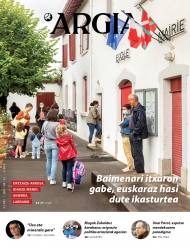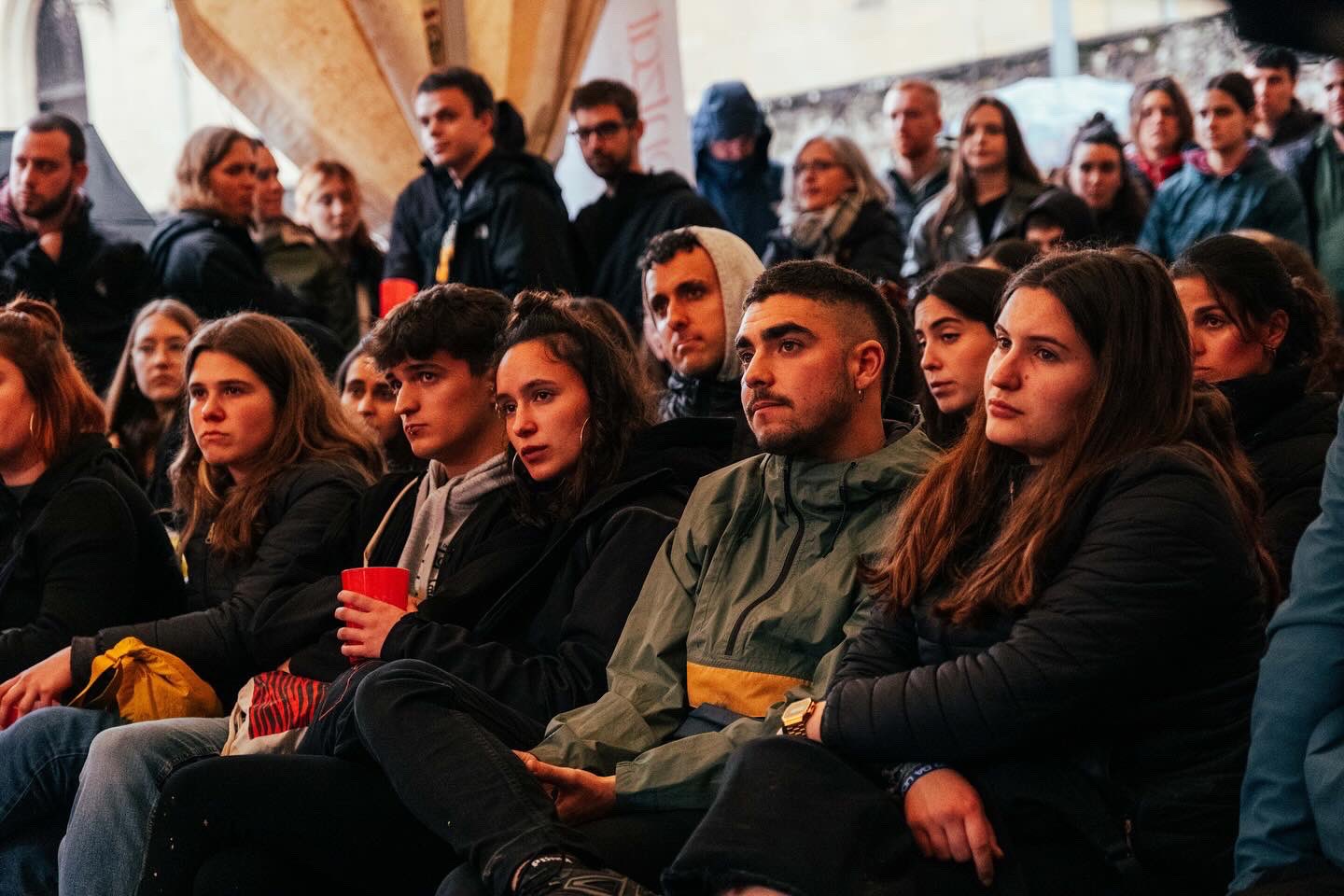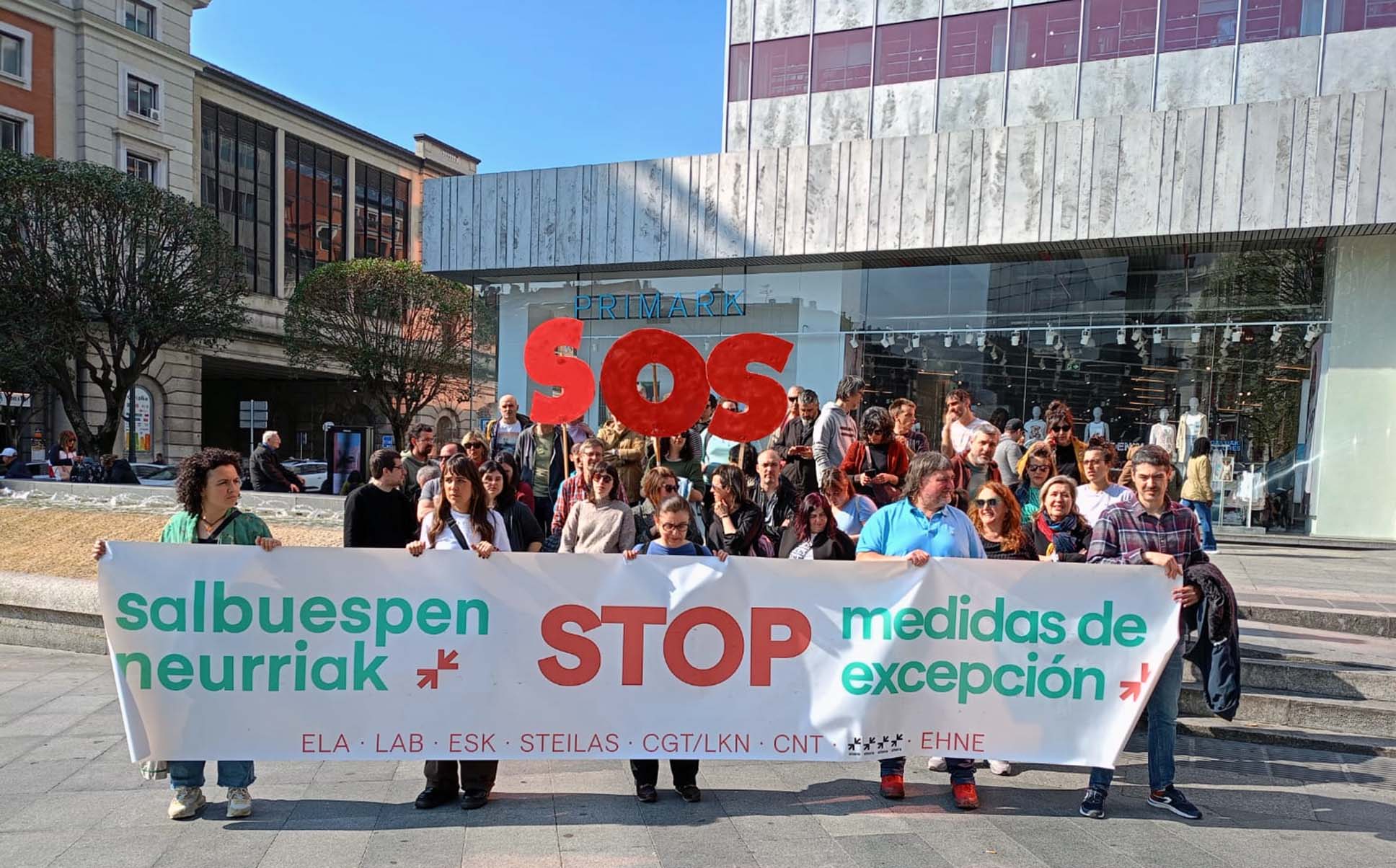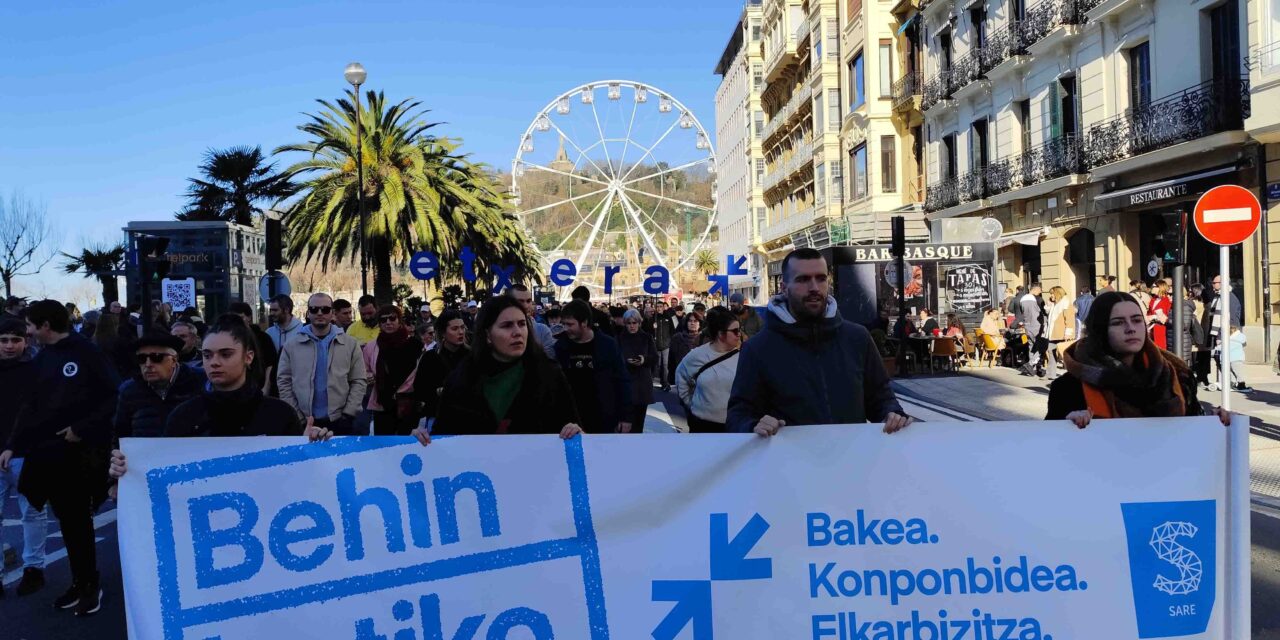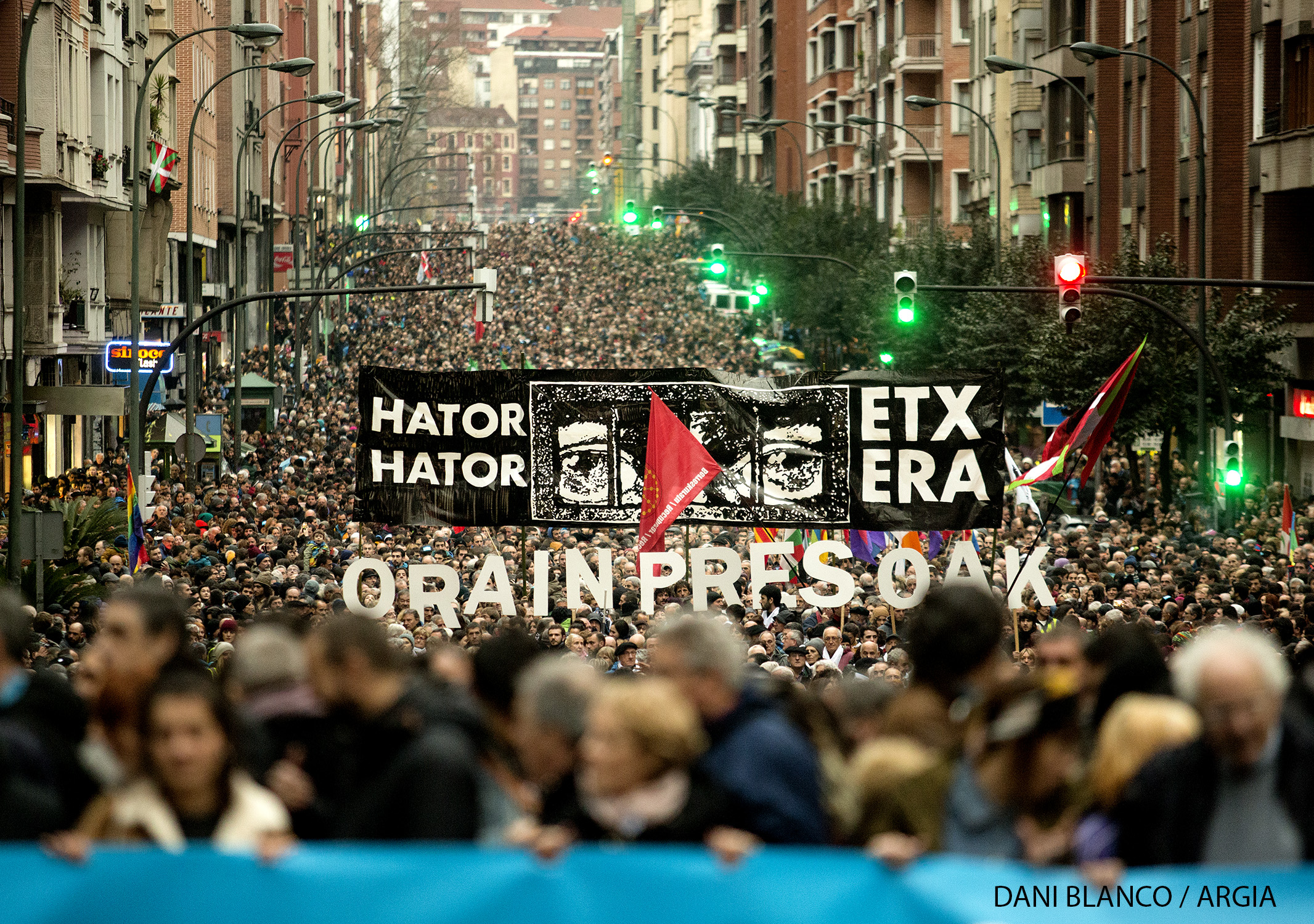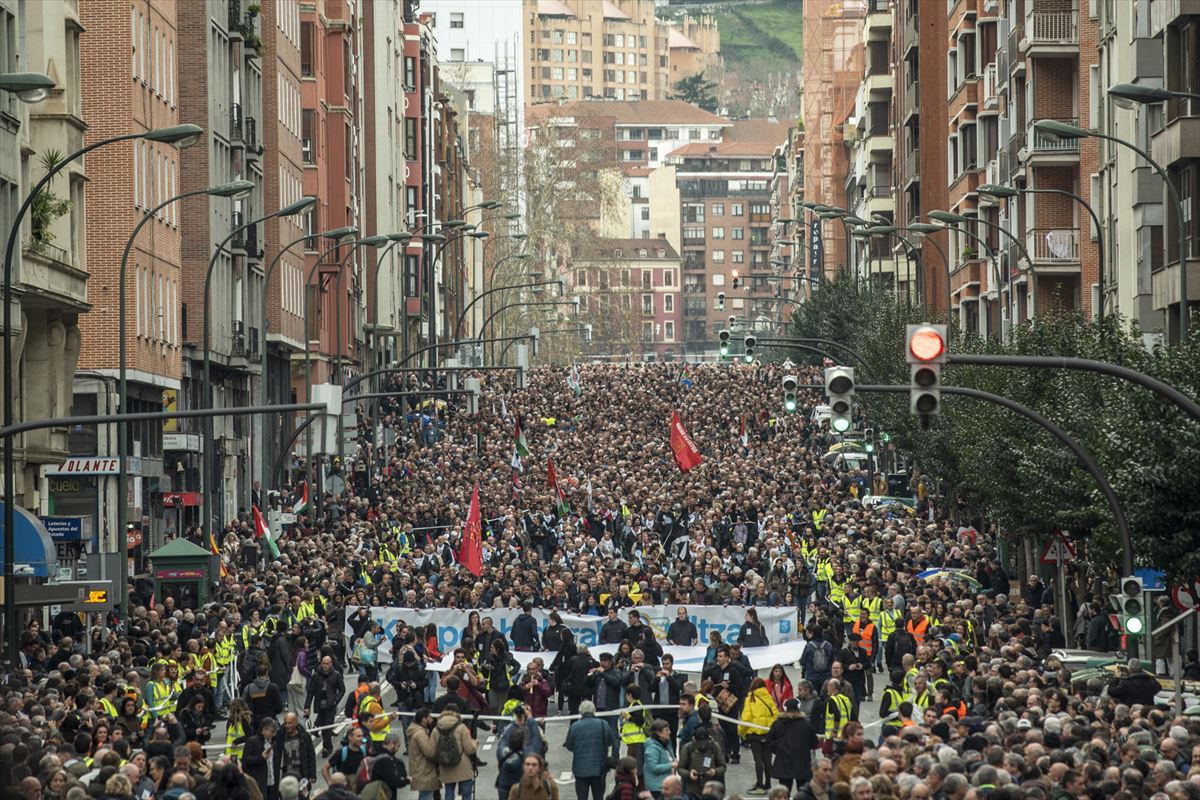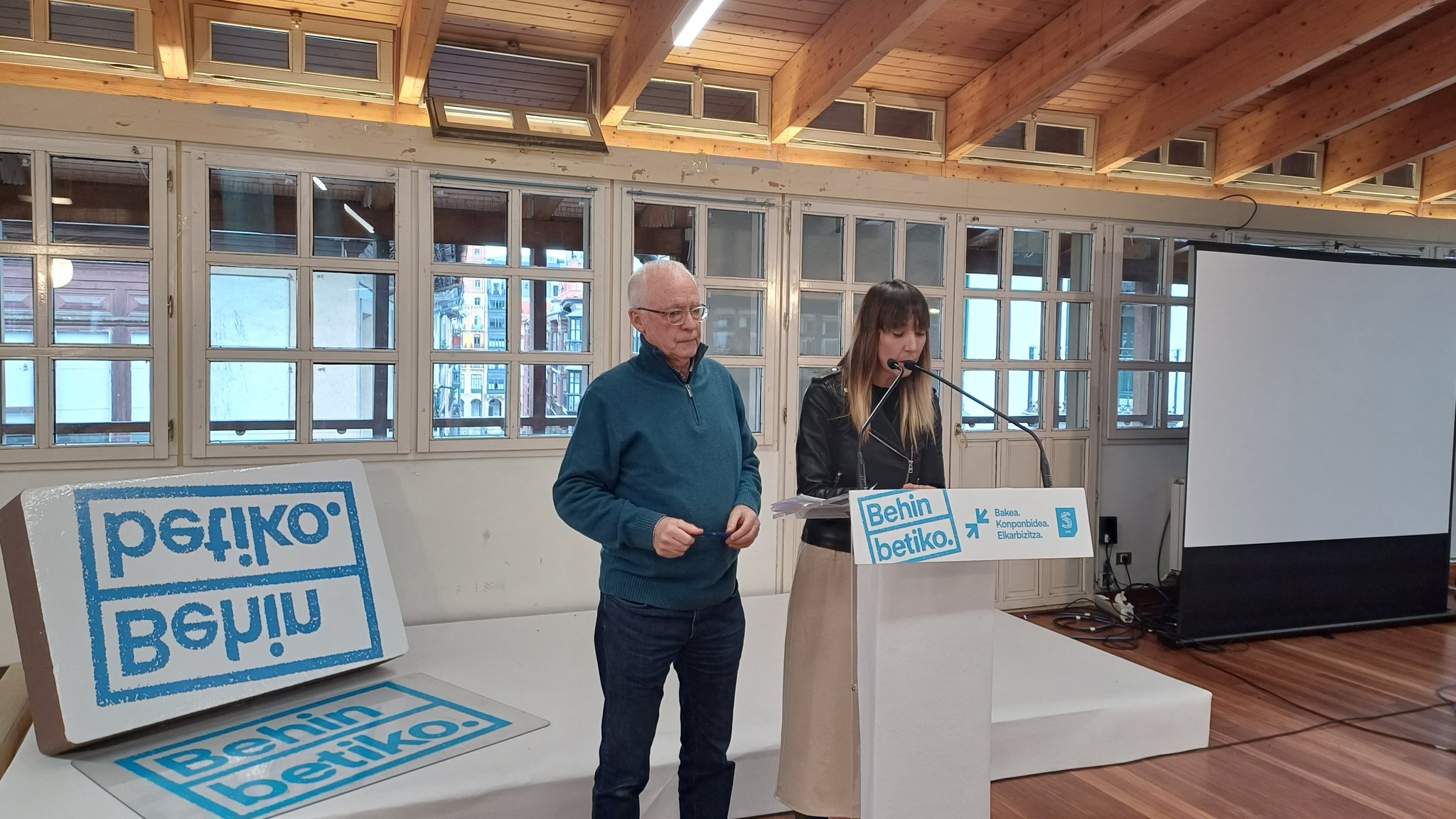Sanction on sanction
- On 18 September, the March of Solidarity will be held in Arrasate, an event held annually in defence of their rights, taking into account the prisoners and political exiles of the people. A people who have been hospitalized and exiled by twenty-two people, Unai Parot, currently has one prisoner, and two citizens cannot return to their people: Eugenio Barrutia Arbe in Venezuela and Joxe Manuel Pagoaga, Peixoto, in the Northern Basque Country. This year they have a special claim for the day: The end of the Spanish emergency legislation.

The lawsuit is no joke because the Kingdom of Spain built a special legal network to provide a repressive legal response to the political problem during the war against ETA, such as the ZEN of the 1980s (Northern Special Zone, Northern Special Zone), the reform of the Penal Code of 1995, Law 7/2003 on prison sentences or the Judicial Pardoctrine of 197/2006 of the Supreme Court.
These laws, or the application of the laws, have directly affected Unai Parot (Aljer, 1958), who has been in prison for 31 years, both in compliance with the sentence and in the release of new pleas. Parot may have been the most severely punished prisoner and, in addition to denouncing this situation, the organizers of Solidarity Day argue that in a normal situation he should be released from 2005. In any case, the prison period did not extend beyond 2021. Parot was born in Algeria, but was a young family to Ipar Euskal Herria and carried out youth in Altzürükün. In Arrasate-Mondragon, he also had a family, and that's why they've also considered him as an indigenous prisoner.
The call for mobilisation was announced on 19 July in Arrasate: on 18 September a 31 kilometer journey will take place – the time Parot takes in prison – through the transmission of the witness kilometre. Throughout the month of August many state media outlets resisted this act and, among others, the Civil Guard Union, Jucil, urged the Basque Government and the State Prosecutor’s Office to ban mobilisation because in Arrasate “terrorism can be exalted, attacking the dignity of the victims”. The Sare association is also the organizer of the event and clarifies that “the mobilization is aimed at denouncing the law 7/2003, established by the prisoner Unai Parot, as well as other Basque prisoners”.
.jpg)
Unai Parot, a particularly convicted prisoner, is not a prisoner, either for the associations of victims or for the State. He was a member of ETA's Argala Command and was charged with causing dozens of deaths and injuries. Parot was arrested in Seville in 1990 and in 26 sentences he was sentenced to 4,797 years in prison. Between 1978 and 1990 he was accused of having participated in 32 murders. These included the 1987 attack on the Zaragoza Civil Guard headquarters, which killed 11 people: three civilian guards and the rest of the family, including five children and a 17-year-old boy. He is also charged with many other attacks, especially against the senior officials and members of the security forces of the Spanish Army, including General Guillermo Quintana Lacaci or Prosecutor Carmen Tagle. Parot denounced the torture of the previous police statement during seven days of detention.
Two days after his arrest in Seville, commanders Jon Kepa Parot, Frederic Haranburu and Jakes Esnal were arrested in Labourd and sentenced throughout their lives in a very special case of 1997. Ion Kepa Parot and Esnal are still in jail in Lannemezán, and last year they left Haranburu on parole.
As a result of all this, Parot is punished in a way especial.Segun has told us by his lawyer Haizea Ziluaga, they have always been in the first grade of the prison, like most ETA prisoners, in the regime foreseen for the most dangerous prisoners. This way of life means 20 hours of stay in the cell and 4 hours of patio. The first degree consists of two phases, always maintained in the first phase, in which all meals are made exclusively in the cell. Herrera de la Mancha, Puerto I, Sko-Meco, Valdemoro, Murcia, Almería, Córdoba and Puerto III (Cádiz) for eleven years. Last April he approached Mansilla de León prison and was placed in second grade. In the testimonies of many prisoners it has been read or heard that in prison they have been specially committed to Parot, with isolation, beatings, etc.
State in search of new punishments Despite having conquered nearly 5,000
years in prison, Parot should have served no more than 30 years, according to the Penal Code of 1973, in force at the time of his conviction. 30 years less allowances for criminal benefits in prison. Through them, for good disposition, studies or other eleven reasons, the inmate was able to reduce prison days and some were able to reduce the penalty by 30 years, five, six, seven or ten years.
Over the years, this method of calculation of the sentence was unbearable for the State and in 1995 it modified the Penal Code, raising the maximum years of imprisonment from 30 to 40 years, eliminating the benefits of the reduction of the sentence. The prisoners had to serve 40 whole years with more penalties than that, in short, a prison sentence for almost all their lives, despite the fact that Spanish justice forbids it. The courts since 1995, as the former pensioners had to comply with the 1973 rules. Despite its legislation, the State could not accept the situation, especially when in the early years of the 2000s, after the failure of the Lizarra-Garazi process, the conflict became deeply entrenched. And the way he found it.
Doctrine 197/2006 In the
first place, several changes to the legislation were introduced in 2003, including the centralization of Prison Surveillance at the National Hearing. In a short time, some famous ETA prisoners had to go out into the streets and seek loopholes in the state’s legal structures to prevent it. In 2006, the Spanish National Court removed the rabbit in the case of Unai Parot and, by judgment, decided that his career as a member of ETA could be divided into two blocks, so also his prison sentence, divided into two blocks of 30 years, so that, once the first 30 years had been completed, he would have to start serving the second 30-year sentence.
Parot's defense appealed and the Supreme Court, in judgment 197/2006, gave him the right, correcting the point of view of the National Court, but at the same time removing a new rabbit from the hat: henceforth, the reductions in days of imprisonment for mortgages or redactions would affect only the first sentence and then, once the first sentence is finished, the prisoner would begin to comply with the second sentence. That is why this sentence is also known as the Parot doctrine, because he responded to an appeal brought by him. However, as his family has pointed out on numerous occasions, the prisoner does not like to call him this, and his appointment has brought him problems with several social prisoners, not by his knowledge and often by prison officials, who accuse him of sentencing.
The measure meant that, from now on, mortgages would no longer have any value for prisoners convicted of various sentences over many years. Also in 1994, the Supreme Court considered the matter and decided that the penalties for all sentences would be added to 30 years ' imprisonment, and that the mortgages would be used in this respect. That is, it was indifferent to be 32 years old or 3,000 years old, and the mortgages would be applied to the 30-year penalty. Twelve years later the same court handed down an absolutely unfavourable judgment.
The resolution was a legal scandal and this was also understood in the 2012 judgment of the Court of Human Rights in Strasbourg. The Spanish Government appealed the resolution, but in 2013 the Court in Strasbourg definitively ratified the judgment, ruling that it infringed Articles 5 and 7 of the European Convention on Human Rights: the rights to freedom and legal certainty. As a result, some 70 prisoners were taken to the streets, many of whom had already served in full or almost in full the 30-year sentence.
Parot, De Juana, Troitiño, Apezthegia...The insistence with Parot did not end there and, according to his lawyer Zuloaga, “the criminal law of the enemy has been
clearly imposed”. The review of the reading of sentences has been one of the tools against known prisoners who could soon go out into the street, but there was more. The case of Iñaki de Juana was also very famous at the time, with 30 years of conviction on the street and twelve years of conviction for two letters sent by the National Court to the Egin newspaper in 2006, in which it threatened judges, prison officials and politicians. In response to the appeal, in 2007 the Supreme Court reduced the penalty from twelve to three years. In 2008, she went to De Juana Street.
Anton Troitiño was released in 2011, and seeing what the campaign was running against him could mean, he fled to London. The National Court accused him of re-entering ETA, in the “subapparatus of the Refugee Collective”. He always denied the indictment. She was stradited in 2017 from London and in 2018 she was sentenced to six years. In January of this year he was released on parole after diagnosing incurable cancer.
It is a case like that of Parot, De Juana and Troitiño, as well as that of Carlos Apeztegia, nonsense. In 2013 he was released after 22 years in prison and was arrested again in 2018, as when he was in prison he sent letters to ETA’s management informing him of the possible objectives of the attacks. He is currently serving the term of four years ' imprisonment.
30 + 11: 41 Parot was charged
in February 2006 with another case by the current Minister of the Interior, Fernando Grande-Marlaska. In 2007 he was convicted by the National Court, claiming that he returned to ETA in prison, according to the judgment, because in a letter sent in 2001 he urged the ETA management to commit attacks, also giving him the criteria that they had to be. The defense argued that the convicted person as an eternal remains a member of Spanish justice and that while in prison it is not possible to prosecute and punish twice for the same crime. As the cases in the previous lines show, there is no need to be a great jurist for the State to realise the State’s intentions to punish certain prisoners in particular, while at the same time opening more stringent avenues of punishment; many state jurists also interpreted these issues, in particular the doctrine of 197/2006.
.jpg)
Parot has
three daughters of Leon studying Okin: Wind of 36 years, Forest of 31 and Izar of 22. From his family he receives the visit of Oihana, his 11-year-old daughter and Izar, as well as several people. Her sister has been sick for years now. Oihana lives in Hazparn and now it takes four hours to reach Mansilla. As he remembers, he went to visit his father for the first time in Almería prison, “but before he also went.”
Oihana says her father has experienced very harsh situations. “I remember when three years ago a prisoner committed suicide in Puerto III [Xabier Rey Pamplona]. I had a five-minute phone call and he was skipping me. We had very little time and I had to cut him to tell him that his mother died. It was very hard.” Now he sees his father much better, “and he is noticed when I talk to him. They put it in Module 7 of Mansilla, in the mixed module, surprised by the women who see it. He can also do sports and is doing wrong studies. Time has changed a lot and that has also benefited him: In Puerta he always sees more heat and in León it rains more”. However, the Covid-19 situation says that her daughter has made prison visits worse and that for a year they have not been able to see her father, “during that time we have had three video calls of about 20 minutes each.”
As Lawyer Ziluaga explains, on the basis of the EU framework decision of 2008, Parot asked that the penalty be carried out in Lannemezán or Euskal Herria in 2016, together with other prisoners. Aratz Gómez and Arkaitz Saez, for example, were accepted by the petition, but not by Parot. Following the dissolution of ETA, the request was re-submitted in 2018 by refusing it again. According to Ziluaga, “the political situation of 2018 has nothing to do with that of 2003, so we call for the repeal of derogation laws such as that of 2003. We demand the entry into force of restorative justice, based on reparation, non-repetition and recognition of common pain.”
With the 2007 penalty, Unai Parot was going to leave prison in 2031, but last July he was just approved of the reduction in conditional prison between February and 2007 and, with the new reading, he will leave on 10 July 2029, with almost 40 years of conviction.
“Saihestu egingo dira giza eskubideen, ordenamendu juridikoaren eta espetxeetako tratamendu psikosozialaren aurkako balioak eta jarrerak babestea, justifikatzea eta goratzea ekar dezaketen adierazpenak”, dio, besteak beste, agiriak. Azaroan Eusko Jaurlaritzako... [+]
Asteazken eguerdian berreskuratu du askatasuna astigartarrak, zigorra osorik beteta. Espainiako Auzitegi Nazionalak otsailean inputatu zuen ETAren zuzendaritzako ustezko beste lau kiderekin batera, Gregorio Ordoñezen hilketa leporatuta.
Martxoaren 13an lau urte bete dira Fran Balda arbizuarra istripuz hil zela. Preso, iheslari eta deportatuen etxeratzearen alde egin zuen lan, eta haren bost kidek idatzi diote gutun hau.
Frantziako Poliziak 2002an atxilotu zuen zumarragarra, eta 30 urteko zigorra betetzen ari da. Sare Herritarrak mobilizazioa deitu du datorren ostiralerako, Urretxuko Potros Plazan.
Iratxeren Bidasoaldeko Lagunak ekimenak deituta, dozenaka lagun kalera atera ziren atzo Iratxe Sorzabal preso politiko irundarraren absoluzioa eskatzeko eta behingoz etxera ekartzeko, torturak salatzeaz gain.
Sare Herritarrak antolatuta, pasa den urtarrilaren 11n Bilboko kaleak bete zituen manifestazio jendetsuaren ondoren, berriz sortu da eztabaida, euskal presoei salbuespen legeriarik aplikatzen ote zaion. Gure iritzia azaltzen saiatuko gara.
Espetxe politikan aldaketa nabarmena... [+]
Just as we experienced the flourishing of the Basque Country with the help of the artists, so that this time, taking advantage of their impulses, we continue to make our way together giving the necessary support to the Basque political prisoners, exiles and deportees
The... [+]
Jar gaitezen 2025erako proposamen politiko gisa, Espainiako Auzitegi Kolonialaren (AN) epai guztiak berrikusten hasteko eta makila bakoitzak bere belari eusteko.
Unionismoarekin lerrokatutako alderdi, sindikatu eta gizarte-erakunde gehienek, eta ez bakarrik horrela... [+]
Next Saturday, 11 January, the Sare citizens' network called for a new demonstration in Bilbao in defence of the rights of Basque prisoners. This is a unique opportunity to move forward on the path of coexistence in our people, after decades of violent confrontation and, even... [+]









